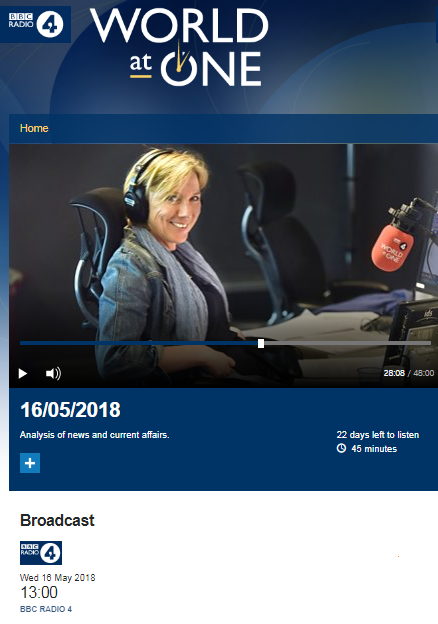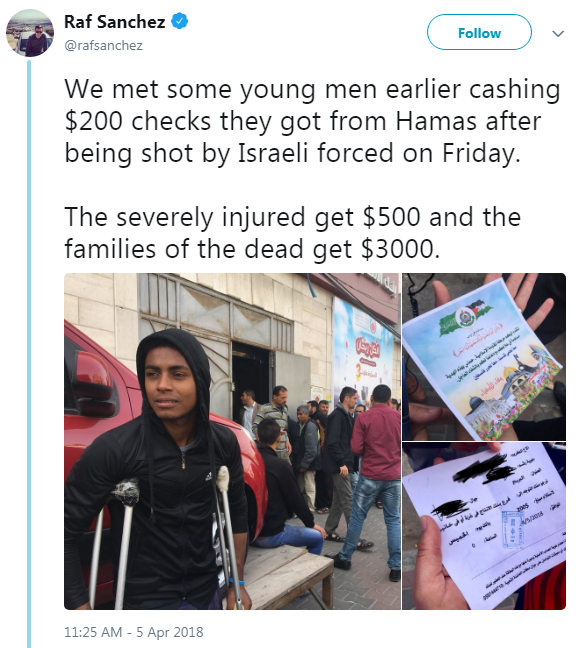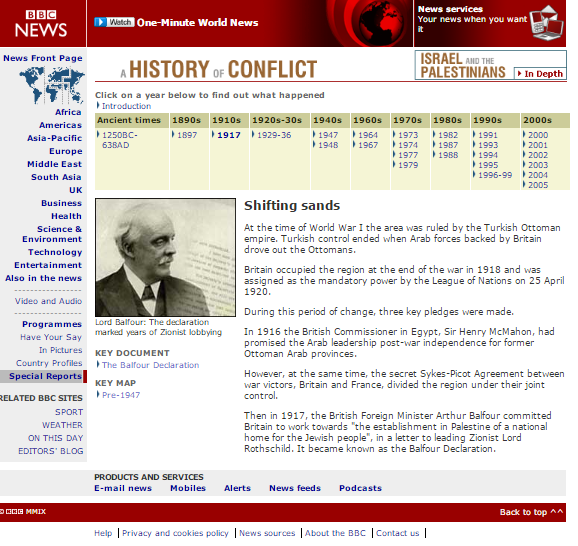As we saw in part one of this post, a filmed report by Jeremy Bowen aired on May 16th downplayed Hamas’ role in organising, encouraging and facilitating the ‘Great Return March’ publicity stunt that has been going on since the end of March.
A report from the BBC Jerusalem bureau’s Tom Bateman heard by listeners to BBC Radio 4’s ‘World at One’ on the same day included the same messaging.
Presenter Sarah Montague introduced the item (from 25:03 here) by promoting a narrative seen in much of the BBC’s coverage: alleged linkage between the ‘Great Return March’ violence – repeatedly described as “protests” – and the relocation of the US embassy in Israel.
[emphasis in italics in the original, emphasis in bold added]
Montague: “Now, Palestinian protests on the Gaza-Israel border have dropped off dramatically after more than 60 people died during demonstrations against the United States relocating its embassy in Israel from Tel Aviv to Jerusalem. Tom Bateman is our Middle East correspondent – he’s in Gaza – and Tom; I know you’ve been speaking to people who were involved in the protests this week.”
Bateman: “Yes, Sarah. The question about the motivation for the protests has become a contentious one amid the recriminations over Israel’s actions in killing more than 60 people this week. Benjamin Netanyahu has said that Hamas, the Islamist group that controls Gaza, was sending people to the perimeter; even paying them to put themselves in the line of fire and to try to storm the fence.”
Of course not only Israel’s prime minister had noted Hamas’ role in encouraging the violence: by the time Bateman produced this report the ISA had published information on that subject given by Palestinians who were arrested while infiltrating Israeli territory. Hamas’ pledge to pay rioters injured or killed while participating in the ‘Great Return March’ had been extensively reported over a month before Bateman made this report – including by Western journalists.
Bateman went on:
Bateman: “Hamas and Islamic Jihad –another militant group – have acknowledged that 13 of their members died but Hamas says their supporters were unarmed.”
Indeed at the time Hamas had claimed ten of the dead and the PIJ had claimed three – including one person described as a child by the BBC. However, within hours of Bateman’s report having been aired, a Hamas official admitted that fifty of the people killed on May 14th were members of his organisation, meaning that at least 53 of the sixty-two dead were affiliated with terrorist groups. No footnote has been added to the webpage of this programme – which is still available to audiences – advising them of that development.
By the time Bateman’s report was broadcast, the IDF had announced that among the 62 dead were eight armed Hamas operatives killed during an incursion attempt. Bateman’s uncritical amplification of Hamas’ claim that “their supporters were unarmed” therefore obviously raises serious questions about the reliability of BBC reporting.
Bateman next went on to promote the same theme as was seen in Jeremy Bowen’s filmed report:
Bateman: “Now I’ve spoken to a number of men and women who’ve been at the demonstrations: none answered yes when I asked if Hamas had sent them. They were prepared to talk about unrest. Many referred to the issue that they see as at the heart of the so-called ‘Great March of Return’ – yesterday’s 70th anniversary of their ancestors’ displacement when Israel was created.”
Listeners then heard a conversation between Bateman and an inadequately identified person presented as a “student of English Literature” who barely speaks intelligible English.
Bateman: “I spoke to 21 year-old Ahmed – a student of English Literature at Al Aqsa University – who’s been attending the seven weeks of protests since they started.
Bateman: “When you went to the protests, what did you do?”
Ahmed: “I stood on the border and we burn the caoutchouc.”
Bateman: “The tyres.”
Ahmed: “Yes tyres, the tyres.”
Bateman: “Were you hoping to break down the fence? To break it down? To go through?”
Ahmed: “Yes but the Jews he shoot the people and shoot anybody who come to him.”
Bateman: “But do you think you could have got through that fence? Do you think it was possible to go through the fence?”
Ahmed: “No, no, no, no. It’s impossible. It’s impossible.”
Bateman: “If you try and break the fence down, you mean, you’d be shot. So why, why, why then were you burning the tyres? Why were you trying to…”
Ahmed: “To tell them that we are to protest the decision of Trump’s that move the USA to Jerusalem. We will [want to go] back to our home [Israel] but this idea is peaceful. We are a peacefully people.”
Bateman: “When you decided to go to the protest, why did you do that? Was anyone suggesting that you should go?”
Ahmed: “OK.”
Bateman: “Was anyone telling you to? Or was it that you….”
Ahmed: “No, no, no, no. I go to protest with my beliefs and my…”
Bateman: “Your own beliefs?”
Ahmed: “Yes.”
Bateman: “Because Israel says that Hamas is telling people to go.”
Ahmed: “No, no, no. That’s not right. It’s an issue of all Palestinian…”
The report was suddenly cut off at that point.
Hamas’ involvement in preparations for the May 14th chapter of the ‘Great Return March’ was well documented even before the event and, as the ITIC recorded, even the top Hamas leader in Gaza was involved:
“Yahya Sinwar, head of Hamas’s Political Bureau in the Gaza Strip, is personally involved in the preparations. He held a preparatory meeting for the events called “the March of the Millions” with representatives of the various organizations, activists of the “Return March” and young Palestinians from the Gaza Strip. The meeting was also attended by senior media figures. At the meeting, he called for extensive participation in the forthcoming events. He called on his audience to carry out the protest actions at all costs, saying that they would rather die as shaheeds; or die hungry and respected rather than humiliated and oppressed. Sinwar further noted in his encouragement statement to the youth that “he is afraid of dying in bed, and is hoping to die as a shaheed in the Return marches”.
Nevertheless, as we have seen in this two-part post, the BBC was clearly very keen to have its funding public believe that Hamas’ role in organising, encouraging and facilitating the ‘Great Return March’ is a figment of Israel’s imagination. How that can possibly be considered to meet the BBC’s obligation to provide its funding public with “accurate and impartial news” is of course a mystery.
Related Articles:
BBC News plays down Hamas role in Gaza violence – part one




